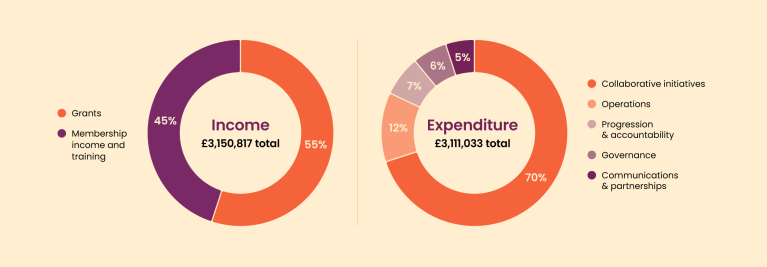
The Ethical Trading Initiative (ETI) is a not-for-profit company limited by guarantee, registered in England and Wales.
Its founding documents clearly articulate its purpose:
‘The company is established to promote and encourage human rights in supply chains to improve conditions for workers and their communities in the supply chains of companies supplying products and services.’
Our Board
ETI is governed by a Board of Directors who represent its tripartite membership - of NGOs, trade unions and companies - in equal numbers, alongside one staff representative and a Board Chair. Each Director is registered as a Non-Executive Director with Companies House as per UK Company Law.
The Board and its sub-committees (Finance, Remunerations, and the Risk and Audit Committee) guide ETI’s strategic direction. The Board is responsible for the approval, promotion, and termination of ETI membership, based on a member’s approach to human rights and engagement with ETI.
Our Board members are elected from both within our membership and externally, based on interest in what we do and a range of perspectives and skills. They are elected and serve for a three-year term. If they are interested in remaining on the Board, members can be re-elected. Board members nominate a safeguarding representative to bring any safeguarding issues raised internally, externally or via our whistleblowing channel, to the Boards attention.
Membership representation
Each member organisation appoints an Authorised Representative to feed into decisions at each Annual General Meeting. Authorised Representatives vote on areas including ETI’s annual accounts, new Board representatives and annual auditors. Any changes to ETI’s Articles of Association are also approved by Authorised Representatives.
The ETI Member Charter sets out the ways of working across the membership and with the secretariat.
The ETI secretariat
Under the Board’s oversight, the secretariat delivers ETI's strategy. We drive collective action on enduring issues; promote corporate transparency and accountability and advise on how to better align with international business and human rights standards - guided by the UN Guiding Principles for Business and Human Rights, that informs our ETI Base Code.
We achieve this by: advocating directly with our membership, developing tools and resources, running training courses, organising events, and collaborating with a wide range of external organisations.
Funding
ETI's income is generated through membership fees, donor funding and income from our training courses. Membership fees are paid by company members, calculated as a percentage of turnover. Donor funds are received from institutional donors, as well as trusts and foundations. Training is open to all with courses delivered several times a year.
Members will contribute funds to projects of interest to them, typically subsidised by donor funds.
Our expenditure supports the running of the ETI secretariat, work with our tripartite membership in line with our Theory of Change and strategy including the delivery of projects all focused on addressing the risks faced by workers in supply chains.
ETI currently generates around £3.1m in income per year.

